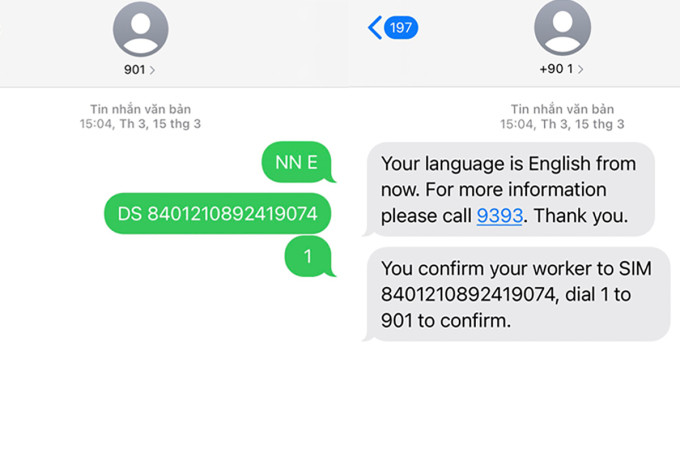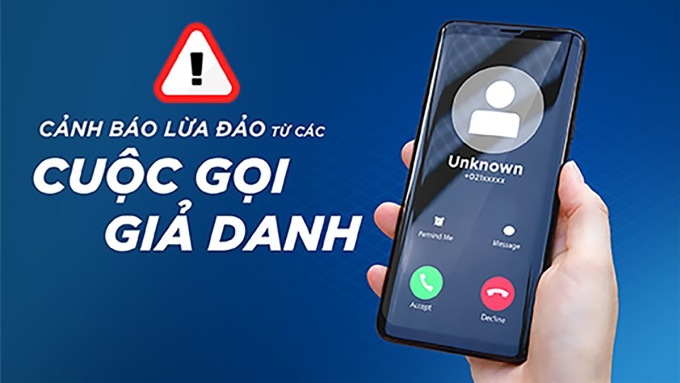Lost money in credit account because of trusting 'fake operator'
Suddenly given 50,000 VND in her phone account, Thao believed the "fake operator" and followed the instructions to upgrade her SIM for free, only to have all the money in her credit card taken.
More than 10 days ago, Thao, an office worker in Hanoi, received a call from 0936.xxx.xxx, who introduced herself as a MobiFone operator. The woman with a southern accent said that Thao was one of the "luckiest customers of the day" who received a VND50,000 promotion from the operator. At the same time the call was taking place, Thao saw a message that she had received money.
"The message was sent from the number +9221. I checked and saw that the money had been received in my account. Moreover, recently, employees of companies and network operators have been using their personal mobile phone numbers to call customers, so I believe this is a genuine operator," Thao said.
During the conversation, the other side introduced the "free sim upgrade" package from 4G to 5G. While sitting at the computer working, Thao looked up Google and found that the network was offering this program. Seeing that it was very convenient because there was a staff to guide her, and she could do everything on her phone, without having to go to the counter, Thao agreed.
She said that following the instructions of the "operator", she sent three messages, including one with the syntax "DS 840121xxxxhx" to the number 901. One second after the message was sent successfully, Thao's phone immediately lost signal. However, before hanging up, the scammer said the signal loss was due to the SIM being issued, and that after a few minutes everything would be normal. Thao later realized that they said this so that the victim would not be suspicious, giving time for their accomplices to steal the money.
Immediately after that, Thao's credit card account was continuously deducted but "there was no notification message on the phone". The application showed that the account was making a purchase payment even though Thao did not make any transaction. Discovering that her SIM card usage rights had been taken, Thao quickly transferred all the money in her salary account to her friends to protect it.
"At that time, I called the operator and realized I had been scammed, so I asked them to block my SIM card immediately. However, more than 5 million VND in my credit account had been taken," Thao recounted, adding that a few days later, she had to bring her personal documents to the transaction office to complete the procedure to reissue the SIM card.
 |
| Texting syntax caused Thao's SIM card to be taken by a thief. Photo: Provided by the character |
Like Thao, Thu Hoai, in a northern province, was working when she received a call from a female operator inviting her to upgrade her SIM to 5G for free. Having switched from a prepaid to a postpaid package of Viettel network in this way, Hoai agreed to upgrade because she did not have to go to the store.
Following the scammer's instructions, Hoai had just texted the syntax DS 84xxxx to 901 when suddenly her phone lost signal. She tried to check her account balance, text, and call, but all failed. Suspecting she had been scammed, Hoai still "believed" that the SIM was being upgraded, so there was a problem.
After more than 10 minutes, the SIM card was still not usable. Hoai checked and discovered that all the money had been withdrawn from her bank account and Momo e-wallet. "Only then did I realize I had been scammed, so I called the hotline to block the SIM card. However, more than 20 million VND in the account had been withdrawn," Hoai said.
Hoai wondered why scammers knew all her personal information to trick her. She hoped that network operators would provide a single hotline number so that people would not be confused by scam calls.
Faced with the problem of people constantly "falling into traps", Mobifone has warned that scammers often have many scenarios to request 4G, 5G SIM upgrades. Mobifone recommends that when customers receive calls requesting SIM upgrades, they should carefully check the information or contact the switchboard 9090, 18001090 for answers. Furthermore, people absolutely do not provide OTP codes or compose messages or syntax according to the instructions of anyone claiming to be a network employee over the phone.
 |
| Photo illustration internet. |
Expert Ngo Minh Hieu, National Cyber Security Monitoring Center, said that phone numbers are now "very important" to each person as they are linked to daily transactions, bank accounts, e-wallets, and social network accounts. Losing control of a phone number is very dangerous, and all the money in the accounts can easily be stolen.
Mr. Hieu advised people not to switch or upgrade SIM cards over the phone but to go to the network operator's transaction counter to do it directly. At that time, all rights and safety of SIM owners are guaranteed. "Absolutely, do not perform operations on the phone according to the instructions of a person that you cannot accurately determine whether it is a call center employee or not."
Experts say that scammers often use strange numbers or regular phone numbers to make scam calls, making victims lose their vigilance. Therefore, people should only listen to calls from the official switchboard numbers of network operators. In case of accidentally texting the scammer's syntax, causing the SIM to be taken over, the victim should immediately use another number to call the switchboard to block the SIM or block transactions of bank accounts and e-wallets.
According to Mr. Hieu, currently the scammers are very sophisticated, using only a tool on social networks, when they enter the phone number, they will get the user's personal information such as citizen identification number, permanent address, date of birth, social account address. When they have personal information, they will hit the victim's psychology to scam.
About the scam:Police said that criminals often collect personal information of users on the internet. Then they take advantage of the policy of mobile network operators that allows subscribers to redirect calls to other phone numbers to pretend to be call center staff calling to advise on SIM upgrades. To gain trust, they ask victims to text messages with the syntax to trick the victims into redirecting calls to their number.
When the victim successfully sends a message according to the given syntax, they will lose control of the SIM. At this point, the thief's SIM becomes the owner's SIM.
Next, they log into the victim's bank accounts and e-wallets and perform the "forgot password" operation. Then the scammer will receive an OTP authentication code sent by the service provider to easily use other people's bank accounts and e-wallets.

